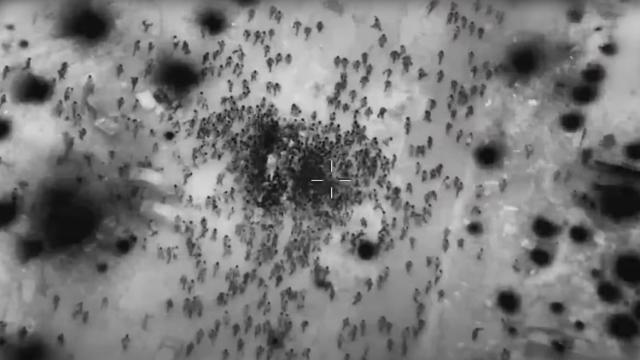Bread massacre shows the urgency of a truce, and the 'extreme' need for food, says Gaza pastor
At least 112 people died and more than 760 were wounded in the UN aid convoy attack. Hamas and Israel blame each other; negotiations are at risk. For Fr Romanelli, people are dying under the bombs and widespread hunger every day; a ceasefire is needed because "the situation is really bad.” The Israeli army struck near the parish compound. Pope Francis expresses his support for the victims.
Jerusalem (AsiaNews) – The attack on the aid convoy, the “bread massacre” caused by widespread hunger gripping Gaza every day, is the mirror of the war launched by Israel against Hamas in response to the attack on 7 October by the group that controls the Strip.
In this conflict the lack of food also kills like bombs. According to the United Nations at least 576,000 people, a quarter of the population, faces "catastrophic" levels of food insecurity.
Yesterday marks another chapter in a tragedy that has especially hit the civilian population. The incident involving the aid convoy left 112 people dead with more than 760 wounded, with the usual exchange of accusations between the Jewish State and the Palestinian extremist movement, consequence of a reality that is becoming increasingly disastrous.
For its part, the Palestinian Ministry of Health reported the death of 10 children from dehydration and malnutrition in hospitals in northern Gaza.
For Fr Gabriel Romanelli, pastor at the Holy Family parish in Gaza, a ceasefire is increasingly "urgent". At present, he is confined to Jerusalem (before that he was in Bethlehem), unable to go home after Israel closed the territory’s border at the start of the war.
“Bombardment is killing people every day, and getting worse,” Fr Romanelli said. “Hunger, it must be said, is also bad and widespread, for everybody, but especially in the north, because getting aid in has been hard since the start of the war.”
Guns must fall silent, and aid must be sent, said the Argentine priest of the Incarnate Word, speaking to AsiaNews. “People are dying, in dire need of food, water, medicines" and what happened yesterday "is a sign that the situation is really bad.”
On the 145th day of the war in the Gaza Strip, the death toll has topped 30,000 with more than 70,000 wounded on the Palestinian side, whereas Hamas’s terror attack in southern Israel on 7 October killed approximately 1,200 people, sparking the Jewish state's military response.
In Gaza, people are also dying from hunger and despair, like yesterday, when, according to Hamas, Israeli soldiers fired into a crowd of people seeking food amid a chaotic melee.
A convoy of 30 lorries with aid was attacked at dawn, which prompted the United Nations to suspend distribution precisely because of the fear of an incident.
Israel's version of what happened in northern Gaza is different. Israeli soldiers fired warning shots in the air to disperse a crowd, but in the general confusion several people were crushed and killed.
Sources told The Associated Press (AP) that Israeli troops opened fire on civilians who were trying to take bags of flour and canned goods from the lorries. At first, the attackers hid, and then returned to the vehicles. Israeli soldiers responded by firing again on the crowd and causing the carnage.
The condemnation by Arab countries for what happened is general and unanimous, while US President of Joe Biden fears that it could hinder – if not sink – negotiations aimed at the release of Israeli hostages and a ceasefire.
The latter remains the priority, also because a quarter of the 2.3 million Palestinians in Gaza are at risk of starvation – amid widespread chaos, about 80 per cent of residents have had to flee their homes, many of them destroyed.
Meanwhile, at the Holy Family parish compound, as in the rest of the Strip, “people are trying to move forward and resist," Fr Romanelli explained, but "the situation is serious because after a lull in the bombardment of a few weeks, the bombs are falling again."
This is the case “in our neighbourhood of al-Zeitun" where people "live in a state of anguish. A truce, a ceasefire, an exchange of hostages were talked about but it seems that words and pleas are destined to fall on deaf ears,” Fr Romanelli said.
"Instead of stopping, the impression is that they want to go on with the war" in a frightening escalation, while people are suffering from hunger.
“It is urgent to stop the bombing in Rafah; at the same time though, it is important to guarantee food and aid, including in the north, in Gaza City itself, where at least 400,000 people are in extreme need.”
“We live in a polarised climate, and in a world in which dialogue seems increasingly difficult. But precisely for this reason, a ceasefire is the first thing [to do]; every additional day of war continues the massacre. Because of this, many doors remain closed, innocent people die. More than 70,000 people have been wounded, and only a handful have received treatment.”
Lastly, the clergyman has a thought for Pope Francis, grateful to the Holy Father for calling his deputy pastor, Fr Jusuf Asad, which “he did yesterday. He called him to tell him that he had read the letter a father wrote to his son and that he had blessed them both;” the pontiff “is praying for all of them.”







.png)










